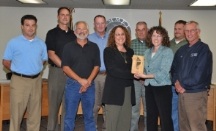Michigan’s premier multi-county recycling program is a green machine
Emmet county recycling serves four northwest Lower Michigan counties and several communities. Recycling is an effective limiter of greenhouse gas emissions.
 “Recycling is the stepchild of the green movement,” Elisa Seltzer saidas we walked about the EmmetCounty Recycling Center. “And yet,” she continued, “When you save materialsfrom decomposing in a landfill and releasing methane and carbon dioxide, andthen reuse it a few miles away as feedstock for local products, that’s bound tohave an impact on our carbon footprint.” Seltzer is the director of the PublicWorks Department and the recycling coordinator for this northwestern Michigan County.
“Recycling is the stepchild of the green movement,” Elisa Seltzer saidas we walked about the EmmetCounty Recycling Center. “And yet,” she continued, “When you save materialsfrom decomposing in a landfill and releasing methane and carbon dioxide, andthen reuse it a few miles away as feedstock for local products, that’s bound tohave an impact on our carbon footprint.” Seltzer is the director of the PublicWorks Department and the recycling coordinator for this northwestern Michigan County.
Elisa is proud, justifiably so,of the 20-year old recycling program that now produces 26 items for wholesaleor retail and serves four counties. On October 13, 2011, Seltzer receivedMichigan’s highest honor for recycling professionals at the Emmet County boardof commissioners meeting.
The Emmet Countyprogram is also completely funded by tipping fees, recycling container rentals,and selling mulch, paper, plastics and metals.
Clearly, channeling a family’s or acommunity’s waste “stream” from landfills and incineration into recycledproducts willreduce greenhouse gas (GHG) emissions in a number of ways. Incinerationreleases carbon dioxide (CO2) and other pollutants, landfillsrelease methane that’s 21 times more potent as a GHG than CO2. Treeshold large quantities of carbon and their continued growth sequesters more ofit. Recycling paper and cardboard holds back carbon from being released as CO2.
Metals from cans can be made into various items which saves energy tomine more minerals and energy to transport and transform them into more cans orother useful items. Brush and tree trimmings can be reformed by composting(yes, some methane is released in the process) and then reusing the nutrientsto grow more carbon dioxide, capturing plants including long-lived woodyperennials without mining and transporting fertilizer. Plastics are made fromhydrocarbons often oil – more mining and transport and definitely anon-renewable resource. Transportation always uses up stored forms of carbon andis the greatest source of carbon dioxide in our present society.
Recycling certainly isn’t new and probably not as dramatic as seeingwindmills and solar panels fill our surroundings, but it is effective, evenbasic, for a greener living.



 Print
Print Email
Email




